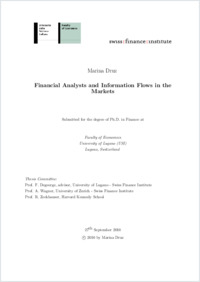Financial analysts and information flows in the markets
- Druz, Marina
- Degeorge, François (Degree supervisor)
-
27.09.2010
86 p
Thèse de doctorat: Università della Svizzera italiana, 2010 (jury note: magna cum laude)
Sell-side analysts
Analyst research
Earnings forecast
Analyst recommendations
Analyst reputation
Conflict of interest
Textual analysis
Conference calls
Signaling
Market efficiency
English
The aim of this research project is to discuss the information flow between managers, analysts and investors in the financial markets. It examines the official information releases such as quarterly earnings announcements, unofficial flows of information between managers and analysts, and uncertain information as interpretation of managers' actions, so-called "signals", used by analysts and investors. The agency problem created by informational inequality of the market participants creates numerous opportunities for manipulations. Managers may not only withhold or misinterpret the information, but they are also able to exercise the pressure on third-parties. Financial analysts are not completely independent of company executives: they need to co-operate with managers to get an access to the information and their employers prefer to keep good relationships with the potential clients for investment banking deals. As a result the investors constantly face the challenge how to evaluate the trustworthiness of external information and how to extract the maximum from the news announced. The two first chapters of this thesis discuss particular potential ways to address this challenge. Chapter 1 adds to the existing literature on analysts' accuracy and conflicts of interests of informational intermediaries in financial markets by studying the problem of trustworthiness of news produced by sell-side analysts. I investigate whether the analysts who are first to switch from positive to negative recommendation about a company are trustworthy. Is it a signal of independence and professionalism or a warning signal of lack of connections with the firm? I find that these analysts have limited access to management-provided information and therefore are not reliable news bringers. Chapter 2 investigates the abilities of textual analysis of earnings announcement conference calls to provide analysts and investors with valuable incremental information beyond the facts stated by managers. It studies how the negativity of manager's word choice, degree of uncertainty in his speech and other textual clues may help to predict the future earnings and likelihood of financial distress. The agency problem hits not only investors, but the managers as well. As the investors aware of potential conflict of interest suspiciously scrutinize any executive's action, the latter lose the flexibility for the actions. As an example, an executive may abstain from rebalancing his portfolio to avoid providing negative signals to the markets by the sale of company's shares. The third chapter examines the potential to attenuate market reaction to the negative signals. I test whether the companies with more timely and extensive coverage are less constrained by "signaling" problem - losses in value caused by the investors' reaction on managers' actions.
- Language
-
- English
- Classification
- Economics
- License
-
License undefined
- Identifiers
-
- RERO DOC 21059
- URN urn:nbn:ch:rero-006-109695
- ARK ark:/12658/srd1318368
- Persistent URL
- https://n2t.net/ark:/12658/srd1318368
Statistics
Document views: 363
File downloads:
- Texte intégral: 146
